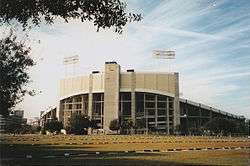Wide Right (Buffalo Bills)
|
Tampa Stadium, the site of Super Bowl XXV. | |||||||||||||||||||
| |||||||||||||||||||
| |||||||||||||||||||
| Date | January 27, 1991 | ||||||||||||||||||
|---|---|---|---|---|---|---|---|---|---|---|---|---|---|---|---|---|---|---|---|
| Stadium | Tampa Stadium, Tampa, Florida | ||||||||||||||||||
| Favorite | Bills by 7 | ||||||||||||||||||
| Referee | Jerry Seeman | ||||||||||||||||||
| Attendance | 73,813 | ||||||||||||||||||
| TV in the United States | |||||||||||||||||||
| Network | ABC | ||||||||||||||||||
| Announcers | Al Michaels, Frank Gifford and Dan Dierdorf | ||||||||||||||||||
Wide Right was sportscaster Al Michaels' description of kicker Scott Norwood's missed 47-yard field goal attempt at the end of Super Bowl XXV on January 27, 1991. This phrase has since become synonymous with the game itself.
The field goal attempt
With eight seconds left in the game, Norwood's Buffalo Bills trailed the New York Giants by a single point. They chose to try a 47-yard field goal, which would win the game and the championship for the Bills. However, 47 yards was considered near the limit of Norwood's kicking range, particularly on a grass field, according to comments during the original game broadcast.[1] Bills head coach Marv Levy also noted that fewer than 50% of such attempts succeeded.[2] In fact, during his career, Norwood was 1 of 5 for field goal attempts of more than 40 yards on grass, and with his longest field goal being 48 yards in that season (which is unusually short by modern NFL standards)[3]
The kick, although it had sufficient distance, passed about a foot to the right of the righthand goalpost and the field goal attempt failed. Television sportscaster Al Michaels, calling the game for American Broadcasting Company (ABC), announced the occurrence to a stunned television audience: "No good...wide right."
The New York Giants took possession with four seconds left and ran out the clock for a 20–19 victory, making this Super Bowl the closest ever. Had Norwood successfully scored it would have likely given the Bills a 22–20 victory, and it would also have been the first Super Bowl to be decided by a game-ending field goal since Jim O'Brien's 32-yard kick which gave the Baltimore Colts a 16–13 victory against the Dallas Cowboys in Super Bowl V.
Aftermath
The Bills lost their first of four consecutive Super Bowl games, and this loss was the closest the team got as the next three Super Bowls ended with the Bills losing by considerable margins (13 points to the Washington Redskins in Super Bowl XXVI, 35 points to the Dallas Cowboys in Super Bowl XXVII, and 17 points to the Cowboys in Super Bowl XXVIII, respectively).[4] The city of Buffalo had not won a major sports championship since 1965 (the second-longest such streak of futility for any city that has at least two major sports franchises, after San Diego (1963)), so Norwood's unsuccessful attempt had an even greater significance.[2]
Norwood would kick for one more season with the Bills before being replaced by Steve Christie for the 1992 season.
See also
- Buffalo '66
- The Comeback
- National Football League lore
- Gary Anderson's missed field goal in the 1998 NFC Championship Game
Notes
- ↑ ABC Sports commentary of Super Bowl XXV
- 1 2 Karl Taro Greenfeld (July 12, 2004). "A Life After Wide Right Thirteen years after missing a Super Bowl-winning field goal, the ex-Bill views his worst moment as a step in the right direction". Sports Illustrated. Retrieved December 11, 2015.
- ↑ http://www.sportingcharts.com/nfl/stats/longest-field-goals/2015/
- ↑ Mosse, David (February 28, 2007). "What if Scott Norwood's kick had split the uprights?". ESPN. Retrieved December 11, 2015.
